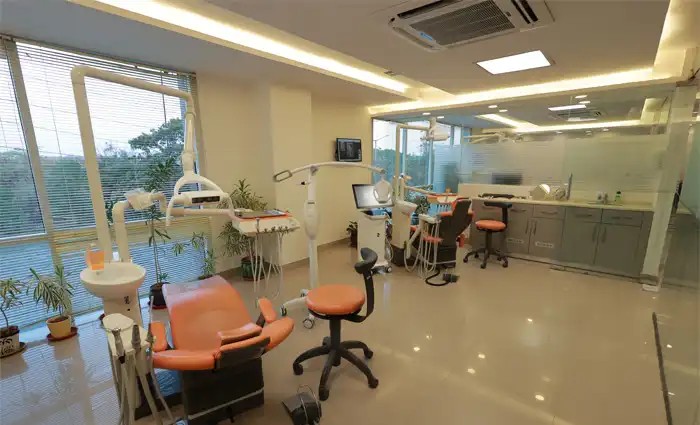Full Mouth Dental Restoration
When dental issues affect the majority of your teeth, it impacts not just your ability to chew and speak but also your confidence and overall health. Full mouth dental restoration offers a comprehensive solution by addressing a variety of oral health concerns, combining aesthetics and restorative dentistry to improve the function, health, and beauty of your mouth.
At Dr. Motiwala’s Dental Clinic, we specialize in full mouth rehabilitation, crafting personalized treatment plans that cater to your unique needs and goals, ensuring you walk away with a healthy, functional, and stunning smile.
What is Full Mouth Dental Restoration?
Full mouth dental restoration, also referred to as full mouth rehabilitation, is a series of dental procedures designed to restore and enhance the health, function, and appearance of your entire mouth. This approach is ideal for patients dealing with multiple dental issues, such as tooth decay, missing teeth, gum disease, and jaw misalignment.
This process combines restorative practices with aesthetic enhancements, ensuring the results are not only functional but also visually pleasing. Treatment plans include addressing jaw joints, bite alignment, smile aesthetics, and even facial support to improve overall oral health and appearance.
Key Benefits of Full Mouth Restoration
- Replaces missing teeth
- Repairs alignment issues and fills gaps
- Treats periodontal disease and temporomandibular disorder symptoms
- Enhances your smile and boosts confidence
- Improves oral and overall health
Who is an Ideal Candidate for Full Mouth Restoration?
Patients experiencing multiple dental issues are typically the best candidates for this transformative procedure. This includes:
- Excessive wear : Teeth worn down from grinding or bruxism.
- Gum disease : Advanced periodontal issues that require treatment.
- Missing teeth : Several or all teeth in one or both arches.
- Bite misalignment : Jaw pain or improper alignment causing discomfort.
- Temporomandibular joint issues : Severe pain or joint deterioration.
- Jawbone density loss : Often due to prolonged tooth loss.
Common Procedures in Full Mouth Restoration
A variety of dental treatments may be employed to achieve the desired results, depending on each patient’s needs:
Dental Crowns
Zirconia crowns or BioZr Bridge are used to restore and protect broken or decayed teeth, ensuring durability and aesthetics.
Dental Implants
Dental implants provide a permanent solution for replacing missing teeth, using artificial roots and crowns to restore function and appearance.
Root Canal Treatment (RCT)
Performed in a single sitting under a microscope, this procedure effectively removes infection while preserving the natural tooth structure.
Fillings
Used to repair cavities and minor tooth damage, ensuring structural integrity and preventing further decay.
Periodontal Treatments
Includes Guided Biofilm Therapy (GBT), an advanced, non-invasive method for removing biofilm, plaque, and tartar, ensuring optimal gum health before restorations.
Bite Raise
This treatment corrects bite misalignment, improving overall oral function and preventing excessive tooth wear.
Smile Designing
Aesthetic procedures aimed at enhancing the overall appearance of the smile, including alignment, shape, and shade correction.
Temporomandibular Joint (TMJ) Treatments
TMJ laser therapy, also known as low-level laser therapy (LLLT) or photobiomodulation, is a non-invasive treatment for TMJ disorders. It uses light energy to reduce pain and inflammation in the jaw joint and surrounding muscles.
The Full Mouth Restoration Process
The journey to a transformed smile involves several key steps, each tailored to your specific needs:
Day 1: Consultation
- Patients undergo thorough consultations where their dental health is assessed.
- The treatment plan is discussed and finalized based on individual needs and goals.
Day 2: Root Canal Treatment
- If necessary, root canal treatments are performed to address any infected or damaged teeth.
- This step ensures that the foundation for the restoration is healthy and stable.
Day 3: Crown Fittings
- Crowns are prepared and fitted onto the treated teeth.
- This involves shaping the crowns to match the natural teeth for optimal functionality and aesthetics.
Day 4: Implants
- Dental implants are surgically placed into the jawbone to serve as artificial roots for missing teeth.
- This step is crucial for restoring both function and appearance.
Day 5: Crown Fixing
- Crowns are securely attached to the implants or existing teeth.
- This finalizes the restoration process, ensuring a natural-looking smile and functional bite.
Day 6: Final Checkup
- A comprehensive evaluation is conducted to ensure everything is in place and functioning correctly.
- Any necessary adjustments are made to ensure patient comfort and satisfaction.
Customized Treatment Plan
Once the evaluation is complete, we develop a personalized treatment plan that addresses your specific concerns. It helps us create a roadmap for achieving a healthy, functional, and aesthetically pleasing smile.
This plan may include a mix of:
- Restorative Procedures: Such as crowns, BioZr bridges, or dental implants.
- Cosmetic Enhancements: Smile Design to enhance the overall appearance of your smile.
- Endodontic Adjustments:Including single-sitting root canal treatments under a microscope to preserve natural teeth.
- Gum and Bone Treatments: Guided Biofilm Therapy (GBT), laser therapy, and deep cleaning to maintain optimal gum and bone health.
- In-House Lab: Ensuring quality control and faster production of teeth, reducing wait times and enhancing precision in dental restorations.
Preparation and initial treatments
Before beginning restorative work, we prepare your oral health foundation to ensure the longevity of your results. This may involve deep cleaning to remove plaque and tartar, treating gum disease to stabilize the surrounding tissues and extracting severely damaged teeth that cannot be restored.
Phased restoration procedures
The restoration process is typically divided into phases, ensuring comfort and precision.
Each phase addresses specific issues:
- Dental Implants: Missing teeth are replaced with durable, natural-looking implants that integrate seamlessly with your jawbone.
- Crowns and Bridges: Damaged teeth are restored with crowns or replaced using bridges, ensuring proper function and aesthetics.
- Veneers or Composite Bonding: Minor chips, cracks, or discolorations are corrected for a polished, radiant smile.
- Orthodontics or Bite Adjustment: Braces, clear aligners, or bite balancing procedures correct alignment iss
Temporary Restorations and Final Placement
In many cases, temporary restorations are placed to protect your teeth and allow you to adjust to the changes before final restorations are fitted. Once the final restorations are ready, they are precisely crafted and secured in place.
Follow-Up and Maintenance
After completing your full mouth restoration, we provide detailed aftercare instructions and schedule regular follow-up visits to monitor your oral health. Long-term success depends on maintaining excellent oral hygiene and routine dental checkups.
Vertical dimension refers to the distance between two facial points when the teeth are in occlusion. Adjusting this dimension during full mouth rehabilitation allows for better jaw alignment, improved aesthetics, and prevention of TMJ issues.
Why Choose Dr. Motiwala’s Dental Clinic?
At Dr. Motiwala’s Dental Clinic, we are committed to delivering outstanding results with the latest dental technologies and techniques.
Why patients trust us:
- Expertise in complex cases: Years of experience in handling challenging restorations.
- Comprehensive care: Every aspect, from diagnosis to treatment, is managed in-house.
- Patient-centered approach: Personalized care ensures your comfort and satisfaction.
- Cutting-edge technology: Advanced diagnostics and tools for precise, lasting results.




